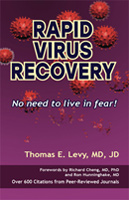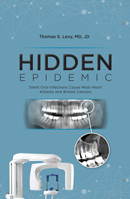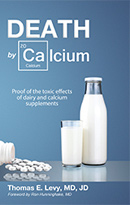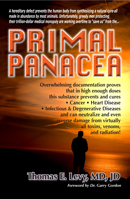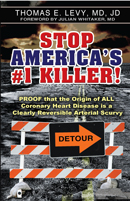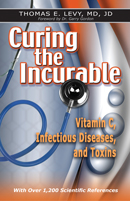Exposing the truth about liposomal nutrients
April 11, 2014 by Dr. Thomas LevyWhile still very new in its use in clinical medicine, liposome science began in the mid-1960s, and the following 40 years saw research into this area grow significantly. Much of the research has focused on modifying liposomes in various ways in order than they might selectively end up where a cancer is located, and their chemotherapy contents can then be selectively released in the hopes of killing the cancer while sparing the rest of the body from the toxicity of the chemotherapy.
To date, liposomes are still not being used very much in this attempt to refine cancer chemotherapy and lessen its associated toxicity.
What has become much more available over the last decade or so has been unmodified liposomes that deliver to all cells their encapsulated nutrients such as vitamin C, glutathione, B-vitamins, alpha lipoic acid, vitamin D, and other commonly supplemented vitamins or nutrients. While many people are now realizing supplemental benefits they never saw before because of the availability of orally administered liposome products, very many people are also depriving themselves of these benefits due to a lack of understanding of the science or the quality of the products they are taking.
My personal connection with liposomes
LivOn Laboratories, Inc. has been the groundbreaker in making liposome-encapsulated nutrients available to the public. I became a consultant to this company about 10 years ago, almost a year after they provided me with some product to try out. I "indulged" them by receiving the product, tossed it into the closet, and didn't think much more about it, until I got sick a few months later.
At that time, I had absolutely no idea what a liposome was, and I had no intention of taking the time to learn.
Then the flu hit me, as hard as I had ever been hit. I had recently closed my clinic, and I no longer had the availability of the intravenous vitamin C upon which I had relied for so long.
So, I took vitamin C powder until the diarrhea was continuous. And then I remembered the liposome product. The only thing that stuck in my mind was that I was told it did not have the bowel/diarrhea effect of high doses of regular vitamin C.
So, I figured that was going to be the only way to get more vitamin C "on board," which I knew was what I needed. I took about five or six grams of the liposome product all at once in juice.
Within 45 minutes to an hour, I was having a difficult time remembering how sick I had felt, as I was starting to feel so good. I took more packets, and I overcame a bad cold/flu more rapidly than I ever had before, even with multiple infusions of 50 to 100 grams of intravenous vitamin C over several days.
I then took the most scientific approach that could be taken: I ignored it. It was only after 8 to 12 months that the same scenario, more or less, repeated itself, once again with me, and a few times with family/friends. I then decided it was time to figure out what liposomes were all about. Better late than never – right?
Which is better liposomal or IV vitamin C?
Circulating widely on the Internet these days is the concept that a small dose of liposome-encapsulated vitamin C is more effective than a larger dose of vitamin C given intravenously. This concept has come from the personal clinical observations that I have just presented.
My clinical opinion is that one gram of properly-produced and orally-ingested liposome-encapsulated vitamin C is as or more effective than 5 to 10 grams of vitamin C given intravenously, for an acute viral syndrome. When someone is ill, my advice is still to use as many forms of vitamin C as available, and dosed as highly as is feasible. I discussed this "Multi-C Protocol" in another article.
Is "homemade" liposome-encapsulated vitamin C good?
If the reader thinks I will say anything to help LivOn and hurt the competition, then there is not much point in reading further. If someone wants to be cynical about my intentions, that's their right, however misguided they might be.
All I can say is that the simple ultrasonic treatment of lecithin and vitamin C does not make liposomes. I have reviewed the sophisticated testing of two different such preparations. Both of them: zero liposomes.
However, the ultrasonic treatment does results in a legitimate emulsion, which is absorbed much better than just regular vitamin C. However, that is just absorption into the blood, not enhanced uptake inside the cells, as with liposomes.
So, such a preparation can certainly help the sick patient, and probably more effectively than just regular vitamin C can help.
It is important to realize, however, that the critically ill patient who continues to worsen while taking a homemade preparation has not yet had the benefit of liposome enhanced vitamin C uptake into cells, only the self-imposed illusion/delusion of that benefit. The enhanced intracellular uptake of the vitamin C, a critical unique aspect of a good liposome supplement, never occurs with the homemade preparation.
Some other companies make real liposome preparations, some do not. I am only in a position to say that LivOn does. The clinical effects that I have witnessed over years now continue to amaze me. But, buyer beware.
Of note, a liposome preparation also does not come in a dry capsule, however, convenient this may be to take versus a thick, oily preparation.
Liposomal vitamin C ‘supercharges’ the immune system
Repeated attempts have been made to compare the impact of liposome-encapsulated nutrients, like vitamin C, with their un-encapsulated counterparts in the blood levels achieved after taking a given dose. For the properly encapsulated liposome preparation, such a comparison is completely irrelevant to what is happening inside the body.
Liposomes predominately get taken up by the lymphatic system in the gut, not the portal circulation. There is no significant "one-pass" liver metabolism that takes place with a quality liposome preparation.
On the other hand, the liposomes, especially in the case of those containing vitamin C, rapidly load up the immune cells in the lymphatics of the gut, achieving high intracellular levels of this nutrient.
Colloquially speaking, one could say this "supercharges" the immune system cells.
The amount of liposome-encapsulated vitamin C that eventually reaches the bloodstream via the thoracic duct is already lessened in amount by this immune cell loading, and what finally reaches the blood quickly gets taken up inside other cells throughout the body. Relative to un-encapsulated, regular vitamin C in the blood, little encapsulated vitamin C gets excreted via the urine.
So, a blood level of one versus the other really gives little meaningful information in comparing potential clinical impact, or in comparing how much vitamin C is actually reaching where it needs to go. When a liposome vitamin C "blood level" declines, it means it's leaving the blood and entering cells, not being excreted by the body.
Is intravenous delivery still the "gold standard"?
For a long time now, intravenous 'anything' has been considered the "gold standard" and the optimal way to give any medicine/nutrient/mineral/vitamin to the body. This is now no longer always the case.
Liposomes that are produced in a high concentration of a tiny enough size (not an inexpensive and easy process, unfortunately), with high quality ingredients (highly refined and costly phosphatidylcholine versus just lecithin) will continue to revolutionize medicine in the years to come. However, it is best to regard quality liposome products as an additional component to your healing protocol. It needn't replace anything, but it can augment everything.
References:
http://www.ncbi.nlm.nih.gov/pubmed/?term=12845247
More articles:
June 22, 2013 | Liposome-Encapsulated Glutathione
July 9, 2013 | Root canals are a primary cause of chronic disease
June 27, 2013 | Calcium, the Toxic Supplement
July 28, 2013 | Vitamin C With Vaccinations
August 3, 2013 | Avoiding Digestive Toxicity
August 10, 2013 | The disease causing dangers of high iron levels
August 19, 2013 | Vitamin C better than chemotherapy
September 2, 2013 | The marketing myth of ’vitamin C complex’
September 18, 2013 | Cardiologist speaks truth about cholesterol and statins
October 2, 2013 | Reverse shingles with vitamin C
October 14, 2013 | The effective prevention and treatment of radiation exposure
October 29, 2013 | Undiagnosed scurvy causes widespread disease
November 19, 2013 | Eliminate lead toxicity by consuming vitamin C
November 29, 2013 | New study says high fat diet is healthy
January 1, 2014 | Osteoporosis is much more than calcium deficiency
February 21, 2014 | Vitamin C is the 'muscle' of the immune system
March 11, 2014 | Reversing disease with the 'multi-C' protocol
April 6, 2014 | The dangers of magnesium deficiency
April 11, 2014 | Exposing the truth about liposomal nutrients
July 13, 2014 | Best nutrients to have in your ‘one a day’ supplement
August 3, 2014 | Surprising solution for Ebola virus
October 19, 2014 | Can natural protocols be an effective treatment for Ebola?
November 16, 2014 | Medical warning: Gluten allergies affect everyone
December 5, 2014 | Holistic dentistry pioneer Dr. Hal Huggins dies at 77 but his legacy will live forever
December 23, 2014 | Can a dental infection cause a massive heart attack?
January 29, 2015 | Most cardiologists shocked to discover the true cause of heart attacks
September 2, 2015 | The number one cause for 90 percent of all heart attacks
February 15, 2016 | The most popular vitamin C myths exposed
February 27, 2016 | How to effectively treat viral infections, including Ebola and Zika
March 14, 2016 | The never-ending war against vitamin C
May 22, 2017 | Vitamin C and sepsis: The genie is now out of the bottle
June 22, 2019 | Most cardiologists shocked to discover the true cause of heart attacks
July 3, 2019 | Can a dental infection cause a massive heart attack?
September 30, 2019 | Medical warning: Gluten allergies affect everyone
March 19, 2020 | Best nutrients to have in your 'one a day' supplement
October 30, 2020 | The dangers of magnesium deficiency
About NaturalHealth365
Dr. Levy regularly contributes brief articles of interest to the NaturalHealth365 website, which can accessed here: www.naturalhealth365.com.


